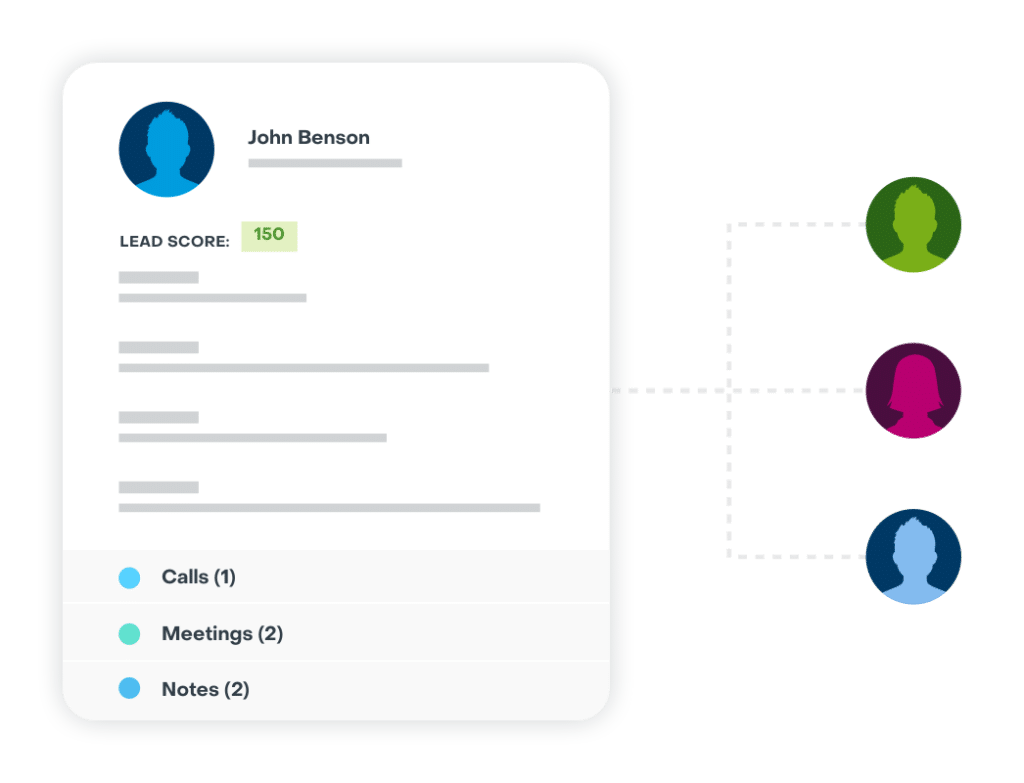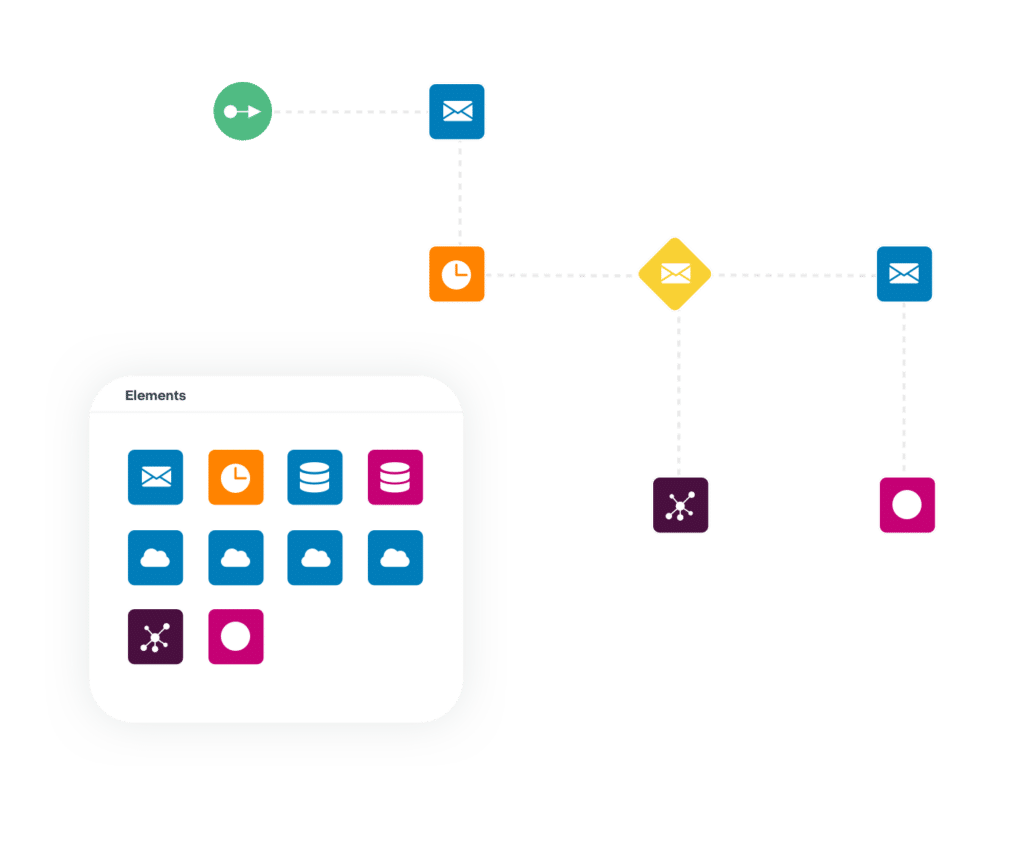Build Your Perfect CRM: 9 Capabilities and Functions Your CRM Needs to Have
Nowadays, CRMs are essential for running successful business operations. These tools offer critical insights into customer and prospect journeys and sales processes, and they can help you cultivate extraordinary relationships with customers. According to our most recent report, some of the most essential CRM-based activities for organizations are forecasting, and pipeline visibility, where 43% of the respondents claimed that such features are the most used within their CRMs, and intent data/lead scoring activities were identified as primary CRM activities by 41% of the respondents. However, a CRM is only as valuable as its capabilities, features, and integrations.
If you’re prospecting the market for a new CRM solution, keep reading because we have some valuable insights into which features, capabilities, and integrations you should look for in your CRM.
1. Contact Management
CRMs today are more than glorified rolodexes, as they were in the past. However, contact management features are still the cornerstone of effective solutions. Robust contact management features offer a standardized way of storing and accessing information, tracking interactions, and cultivating strong relationships with your contacts. Apart from contact information, look into solutions to see a purchase history and each contact’s preferred communication outlets.

Contact management features within CRMs have two primary purposes: they help your business to effectively store and manage contact information and help you streamline customer interactions. As such, you can quickly spot areas in your operations that need improvement in relations with your customers, how you can resolve customer inquiries more effectively, and even personalize how you approach communications with each of your customers.
Effective contact management isn’t solely about tracking interactions; it’s also about nurturing robust relationships with your customers.
2. Lead Management
Lead management features are critical to optimizing customer journeys. According to our 2024 State of CRM Report, when asked about the most vital areas of sales and marketing that CRM has helped optimize, the top three answers were pipeline visibility (37%), quality of leads (35%), and quantity of leads (31%).
Lead management refers to capturing qualified leads and pushing them down the funnel as effectively as possible. The process itself is highly dynamic since it requires fast response times on your end and assigning them to the right people in your sales team. It also involves repeated follow-up interactions.
Because each lead has preferences regarding how they communicate and interact with companies, having relevant data to help you in the process is essential. Here are what stages your lead management solution should follow:
- Lead generation
- Lead qualification and segmentation
- Lead nurturing
- Lead scoring
- Lead distribution
- Lead conversion
- Lead tracking
These stages are critical in both marketing and sales interactions. So, when selecting your new CRM, choose a robust one that seamlessly integrates with all your other systems. This will help all stakeholders across your organization to get clear insights into the lead management process, and it will allow you to boost overall revenue while creating a loyal customer base.

Properly interacting with your leads is critical to boosting those conversion rates. That’s why it’s just as crucial to have a handy way to keep all the relevant info about your leads in one place as it is to manage your existing customers effectively. Lead management features are essential within CRM solutions because they allow you to score each lead and its potential to convert. Your CRM’s lead management features will let you focus your energy on the correct accounts, avoiding wasting time and resources on leads who might not bite. And guess what? Lead management isn’t just for the marketing folks—it’s equally essential for the sales team.
3. Sales Forecasting
To successfully leverage your CRM, you should look into sales forecasting features. This way, you can better understand how your pipeline, quota, forecast, and attainment evolve. Advanced forecasting capabilities feature advanced visualizations, time-aware visualizations, and configurable dashboards.
Robust CRMs have advanced sales forecasting capabilities powered by AI and ML to help you identify potential risks and opportunities. Predictive sales forecasting and analysis are based on historical and third-party data, such as market trends and conditions, and they can help you gain valuable insights into customer behavior. In the long run, they facilitate data-driven decision-making processes.
4. Predictive Analytics
Sometimes, even the most profitable business must deal with limited or incomplete CRM data. In such cases, predictive analytics features can help you fill in the gaps and uncover insights unique to your business. For example, tools such as SugarPredict tap vast external data sources to analyze factors your data doesn’t cover and make predictions that enable companies to make better decisions and focus on the highest-priority sales activities. Predictive analytics features are not only relevant to Sales. They bring immense value to marketing and support teams as well.
Utilizing deep learning models on CRM data, marketing lead activities, and extensive external data sets, predictive analytics offers a clear advantage over models relying solely on CRM data, which can often be flawed or lacking. These advanced capabilities deploy algorithms to pinpoint signals more precisely than traditional rule-based methods. By compiling CRM, marketing, sales, and customer support data with external sources, predictive analytics allow businesses to generate accurate predictions regarding which leads and opportunities are most likely to convert.
5. Generative AI
Generative AI is the latest trend in software engineering. Integrated with your CRM, such features can act as a digital assistant. It can help you free up time and resources and enable higher-value activities.
According to a recent report by McKinsey Digital, about 52% of the value that generative AI could deliver applies to customer operations, marketing, and sales. The report indicates that generative AI has the potential to revolutionize the way organizations use and interact with their CRM by automating work activities that absorb 60 to 70 % of employees’ time today.
The impact generative AI can have on organizations spans from sales and marketing interactions to support:
- With generative AI embedded into their sales automation or CRMs, sales reps can build captivating emails and sales copies, access ready-made call scripts based on each account’s particularities, and generate personalized proposals with real-time customer intelligence.
- Marketing teams can leverage generative AI capabilities to create impactful, highly personalized content from emails, blog copy, and campaigns, automatically translate existing content into varying languages to fill in the gaps in their interactions with foreign audiences and leverage generative AI for precise segmentation lists for their efforts.
- Support representatives can also leverage generative AI in numerous ways; generative AI capabilities can help them handle routine inquiries faster, summarize case histories so they have a complete picture of each case from start to present, and generate personalized guides for customer onboarding or assistance.
6. Workflow Automation
When looking into robust CRM solutions, ensure workflow automation capabilities are part of the package. Apart from helping you automate repetitive tasks, it also offers a standardized way to gather and process large amounts of data. This ensures accuracy and consistency at a cross-departmental level.
Business automation also helps you save time and resources by automating tasks such as lead nurturing, communications, and data entry. Instead of having a human handle these time-consuming processes, your team members can focus on higher-value tasks, where the human touch brings a plus to your business, communications, and overall customer experience.
7. Dashboards and Reporting
Our 2024 State of CRM Report revealed that the second most popular technology to integrate with CRM today is analytics and measurement dashboards (35%), behind only marketing automation. When researching CRM solutions, ensure that reporting capabilities and dashboards are part of the package. Select a CRM with robust out-of-the-box dashboards and reporting capabilities but one that can also be highly personalized. Such features let you closely track marketing, sales, and support metrics.
Reporting capabilities give you the most relevant and recent insights on leads, opportunities, support cases, marketing campaign success, etc. Some CRMs feature intuitive out-of-the-box dashboards and customizable reports, which helps companies ensure that they track the metrics that matter the most to them. With such capabilities, companies can enhance their response times, adapt marketing strategies, and analyze sales trends.
At a macro level, dashboards and reporting help you build consistent customer experiences and anticipate business outcomes. To properly leverage them, they should allow you to monitor anything, from individual performance to team or department performance. All this contributes to elevating the decision-making process by identifying growth and improvement opportunities with increased accuracy.
8. Integration with Other Tools
While your CRM is the central hub of your operations, it should also seamlessly integrate with other tools and solutions. To ensure compatibility and ease of integration, you should look into product suites with extensive capabilities. These should expand from your central hub, aka your CRM, to marketing tools, support, and sales tools. When these tools are developed and deployed by the same vendor, integration mishaps are minimized and data collection facilitated.
However, not all CRM vendors offer auxiliary systems. In this case, you should ensure that you select a robust CRM with solid integration capabilities.

9. Customizability
How customizable is your CRM? If the answer to this question is “not very customizable,” you might need to reconsider your solution of choice. Robust CRMs allow you to tailor systems to predefined workflows and processes that fit your business needs closely. Everything from custom fields, rows, forms, workflows, and reports matters to a business and how efficiently it operates. Customizable (56%) and easy to use (46%) are the terms that best describe the SugarCRM platform, according to our 2024 State of CRM Report.
Interested in learning more about the latest CRM trends and market evolutions? We have all the insights you need in our latest 2024 State of CRM Report!



